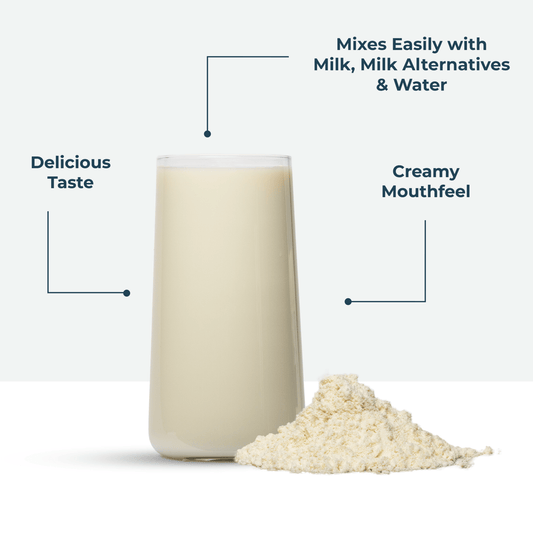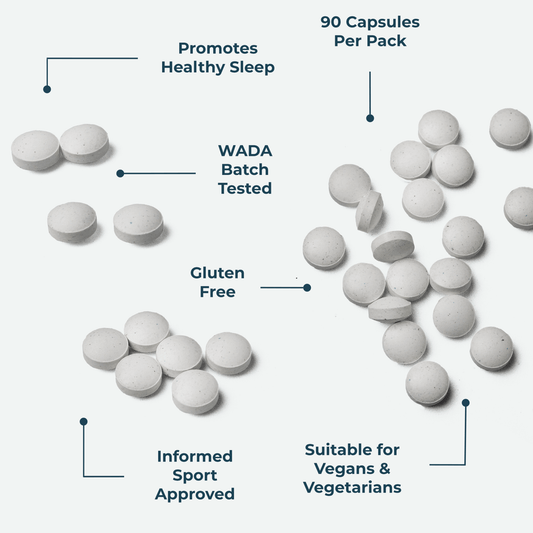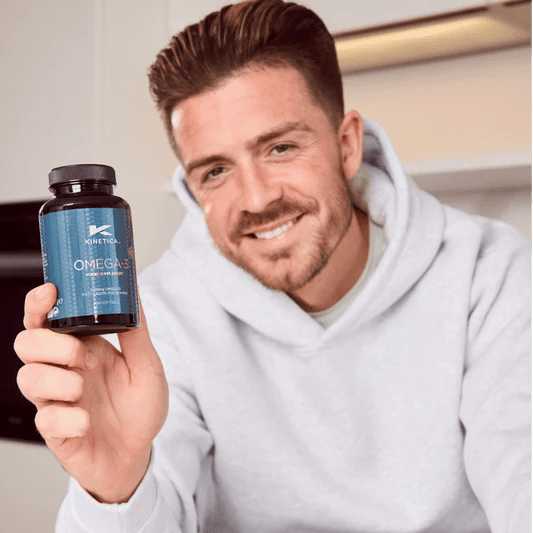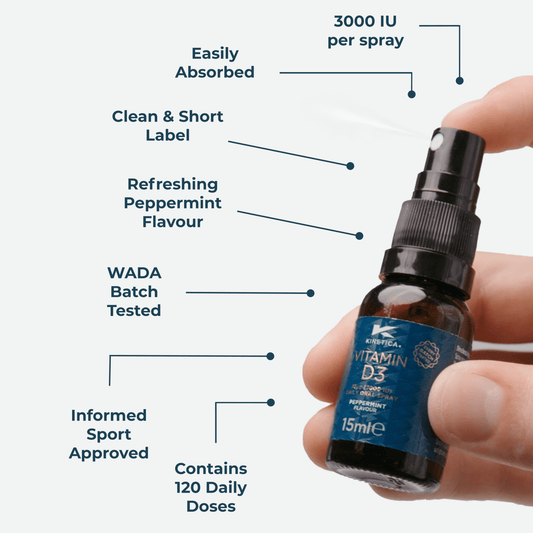How to Support Your Immune Health

A balanced and robust immune system is vital – whether you’re a professional athlete competing on the world stage or a fitness enthusiast navigating training and daily stress. In this post, I’ll share evidence-based strategies to support immunity, helping you to maintain your pace and feel your best.
A primer on the immune system
Let’s begin by helping you understand immunity itself. The immune system is more than just a defence against coughs, colds and the flu; it is an incredible ecosystem in the body designed to help you maintain health and inner balance – also known as homeostasis.
When our immunity is off balance, everything can feel off balance. For example, you might notice that digestion becomes disrupted. Or perhaps the brain feels foggy, and your capacity to focus declines. Our mental health is also sensitive to immune issues, such as disruptions to the gut microbiota (Liu, Wang et al. 2023).
In this sense, looking after immune health is much more than dodging a cold—it’s foundational to our energy, productivity and mood. A good immune system sits at the centre of a great life.
To understand just how vast the immune system is, read this quote from a recent research paper: "Our findings show that an average individual’s immune system consists of approximately 1.8 trillion cells, weighing around 1.2 kg.” (Sender, Weiss et al. 2023). Immunity is a far bigger deal than we often think it is.
What is in the immune system? Essentially, our immune system has two parts: the innate and adaptive immune systems.
The innate immune system is your first line of defence and responds quickly to any foreign invader. Barriers (your skin and mucous membranes that line the tubes from mouth to bottom) prevent pathogens from entering the body, phagocytes (macrophages and neutrophils) kill invaders as they try to come in, and dendritic cells signal to other parts of the immune system when needed (Pelaez-Prestel, Sanchez-Trincado et al. 2021).
The adaptive immune system is your second line of defence. It responds more slowly than the innate immune system but provides targeted and long-lasting protection. It does this by recognising specific pathogens (such as viruses) and can remember them for future encounters (Jordan 2021). Adaptive immunity involves two main cell types: B cells and T cells.
To bring this to life, think of it this way. The innate immune system is akin to castle guards on the wall, stopping invaders from entering the castle grounds. The adaptive immune system consists of elite warriors who get to work when invaders have breached those walls and need to be identified and destroyed.
You can see these two parts of the immune system visualised below:

We will discuss factors that influence the immune system in a moment, but it is worth understanding one more concept in immunity: inflammation.
Many people view inflammation as unfavourable, but it’s an essential process that helps us respond to threats and injury. As with so many other processes in the body, whether inflammation has a net positive or negative effect depends on the dose and duration of that inflammatory response.
There are two phases of inflammation: initiation and resolution. During the initiation phase, pro-inflammatory cytokines, chemokines, and other mediators are released, increasing blood flow, recruiting immune cells to the affected site, and promoting the removal of pathogens or damaged tissue.
The resolution phase is equally crucial in the inflammatory response. It helps restore balance and prevent chronic inflammation. Resolution is a tightly controlled process that suppresses pro-inflammatory signalling, promotes the clearance of dead cells, and supports tissue healing.
Why does this detail matter? It’s everything. Whilst an acute inflammatory response is critical for protecting the body and initiating tissue repair, an excessive or uncontrolled inflammatory reaction can lead to collateral damage, contributing to tissue injury and chronic disease (Li, Zhang et al. 2024).
Sadly, chronic low-grade inflammation is widespread nowadays and contributes to multiple illnesses and diseases, including cardiovascular disease, cancer and type II diabetes (Furman, Campisi et al. 2019). For this reason, maintaining a balanced immune system is vital to optimise your health and lifespan.
Pharmaceuticals can be profoundly important in managing inflammation, but our goal in preventative health is to be proactive and not wait until we become sick before making interventions. Also, only 3% of healthcare expenditure is spent on prevention. Thus, it’s up to us – in how we eat, exercise, manage stress, and support ongoing regeneration.
Here are the lifestyle variables you can modulate to support immunity:

Below, you’ll see tips to support the bottom three variables (renewal, nutrition and exercise):
1. Prioritise Restorative Sleep
Quality sleep is the cornerstone of immune resilience. Poor sleep weakens the immune system, increases susceptibility to infections, and hampers recovery. During sleep, especially in deep stages (NREM3), our bodies produce vital immune cells and cytokines that fight infection and inflammation. Research shows that individuals who consistently get seven to eight hours of restorative sleep experience fewer infections, more efficient recovery, and greater resilience to stress. As the authors of a recent study noted:
“Sleep deprivation has been associated with alterations of innate and adaptive immune parameters, leading to a chronic inflammatory state and an increased risk for infectious pathologies across the board.”(Garbarino, Lanteri et al. 2021)
Quick Tips for BetterSleep:
• Keep a Consistent Schedule: Try to go to bed and wake up at the same time daily, even on weekends. Consistency helps regulate circadian rhythms, which, in turn, support immune health.
• Optimize Sleep Environment: Aim for a bedroom temperature between 18 and 21°C. If the air feels too dry, consider a humidifier, as moisture helps maintain respiratory health.
• Limit Screen Exposure Before Bed: Blue light from devices can disrupt melatonin production, which can delay sleep onset. Instead, create a wind-down routine with reading or other screen-free activities.
2. Focus on Nutrient-Dense Foods
Minimally processed, nutrient-dense foods provide the vitamins, minerals, and antioxidants needed to support immune function. Vitamins C and D, zinc, and antioxidants are all critical for immune resilience.
The opposite is also true. Western dietary patterns (a diet high in fast food, trans-fats, ultra-processed carbohydrates, poor-quality processed proteins, additives and endocrine-disrupting chemicals) can interfere with proper immune function for various reasons, such as nutrient deficiencies, gut dysbiosis and intestinal permeability (Snelson, Tan et al. 2021).
“The Western diet affects various components of the innate immune system - increasing microglial activation in the brain as well as macrophage and dendritic cell activity in the body.” (Butler 2021)
Top Nutrients for Immune Support:
• Vitamin C: Known for its antioxidant properties, vitamin C enhances immune cell function and reduces inflammation. Include foods like citrus fruits, berries, kiwi, and leafy greens.
• Vitamin D: This hormone-like vitamin is crucial for immune regulation and reduces respiratory infections (Martineau, Jolliffe et al. 2017). Given the lack of sunlight in winter, supplementing vitamin D3 is often recommended. Kinetica Sports Vitamin D3 is a great option to get your Recommended Daily Allowance of Vitamin D.
• Zinc: Zinc supports immune cell function and has been shown to reduce the severity and duration of cold symptoms (Hemila, Fitzgerald et al. 2017). Food sources include shellfish, pumpkin seeds, and lentils. Supplements such as Kinetica Sports Zinc Mag+ are also a convenient option for increasing your Zinc intake.
• Plant-based antioxidants: Compounds found in foods like berries, green tea, dark chocolate and turmeric can provide anti-inflammatory and immune-boosting benefits.
3. Prioritise Gut Health
A healthy gut is integral to immune function, with around 70% of our immune cells residing in the gastrointestinal tract (Vighi, Marcucci et al. 2008). Supporting a balanced gut microbiome through diet and lifestyle choices is one of the most effective ways to bolster immunity (Wells, Brummer et al. 2017).
“The microbiota-gut-brain axis thus incorporates the pathways of communication between the microbes and brain, including immune regulation.” (Donoso, Cryan et al. 2023).
Gut-Boosting Strategies:
• Prebiotic Fibre: Foods rich in fibre, such as garlic, onions, leeks, and asparagus, fuel beneficial bacteria and can help maintain a balanced gut environment (Rahman, Barua et al. 2024).
• Fermented Foods: Incorporate fermented foods like kefir, yoghurt, sauerkraut, and kimchi to increase probiotic intake. Probiotics play a crucial role in gut health by enhancing the diversity and resilience of your microbiome (Selhub, Logan et al. 2014).
• Reduce Processed Foods: Refined sugars and processed foods promote harmful bacteria in the gut, which can trigger inflammation and compromise immune health (Aljada, Mohanty et al. 2004).
4. Engage in Regular Movement
Movement not only strengthens muscles and builds heart health, but it also supports immunity. Moderate, consistent exercise enhances immune surveillance, helping the body detect and respond to pathogens more effectively. As one research paper found:
“Sedentary individuals tend to have lower levels of neutrophils, which are crucial for pathogen clearance. A lack of physical activity can also impair T cell function, potentially affecting the adaptive immune response.” (Shao, Verma et al. 2021)
On the other end of the spectrum, it is worth noting that intense training can suppress immunity if recovery is insufficient (Rico-Gonzalez, Clemente et al. 2021). With this in mind, a balanced approach to training is critical.. Using software to monitor health metrics such as heart rate variability can help monitor load successfully (Carrasco-Poyatos, Lopez-Osca et al. 2024).
Top Exercise Tips:
• Prioritise Consistency: If you are just getting started, aim for 150 minutes of moderate weekly exercise, like brisk walking, cycling, or swimming. You can use a Polar sensor to monitor your heart rate and stay in zones one to three (50-80% HRmax). Consistency trumps intensity much of the time.
• Stay flexible: If you are booked for a hard training session or class, but your morning HRV is declining and your morning resting heart rate is climbing, consider this a signal that your body needs recovery and swap the session for something shorter and easier.
• Incorporate Recovery: Add therapeutic activities like yoga, light stretching, or breathwork to counterbalance more intense exercise. These practices enhance parasympathetic activation, supporting immune recovery and resilience (Ketelhut, Oechslin et al. 2024).
Conclusion
This post provides various tools for maintaining immunity. In addition to a high-quality diet, you might also want to address other issues that can impact the immune system's tolerance and effectiveness, such as chronic stress, manage your exposure to environmental toxicants, and supplement strategically (Morey, Boggero et al. 2015, Harding, Pytte et al. 2020). Kinetica Sports range of products including Vitamin D, Omega 3, Zinc Mag+, and Whey Protein all support immunity and resilience in synergistic ways (Prietl, Treiber et al. 2013, Bumrungpert, Pavadhgul et al. 2018, Bischoff-Ferrari, Willett et al. 2022) .












